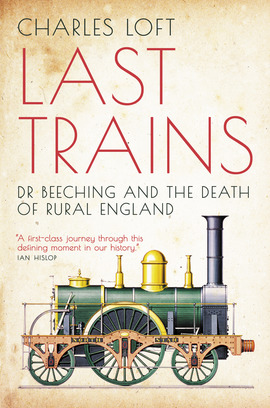Sixty years on from the controversial Beeching Report, railway enthusiast and policy adviser Charles Loft introduces his book, Last Trains.
 What do you think of when you think of England? I mean real England: the England of a nation’s dreams and imagination. Rolling countryside surrounding a village where the houses have names instead of numbers? Neatly trimmed hedges and roses in their gardens? And of course that village has a beautifully kept railway station connected to the outside world by a charmingly antique steam railway, puffing along at one with the countryside.
What do you think of when you think of England? I mean real England: the England of a nation’s dreams and imagination. Rolling countryside surrounding a village where the houses have names instead of numbers? Neatly trimmed hedges and roses in their gardens? And of course that village has a beautifully kept railway station connected to the outside world by a charmingly antique steam railway, puffing along at one with the countryside.
At least it used to.
Then came Dr Beeching, and now that little branch line is a bypass leading to a retail park and the village streets are clogged with traffic, the nearest station a lengthy drive away, that England just a memory, only glimpsed in films.
It is now sixty years since Dr Richard Beeching, chairman of British Railways, published his infamous report proposing the closure of a third of Britain’s passenger rail network – and if the English didn’t like it, the Scots and the Welsh were incandescent! As 1963 recedes into history, Beeching’s name remains synonymous with the mythical axe he took to branch-line Britain. Commemorated on street signs and in pub names, he is often seen as an anti-rail ogre, destroying ‘the poetry of the English landscape’, his report ‘a tragedy for the nation’.
Six stats and facts:
- Over half of the railways open to passengers in 1914 have been closed, most of them since 1958, including an entire main line between Nottingham and London.
- In 1964, Prime Minister Sir Alec Douglas-Home had to be dissuaded from intervening to save a branch line in his own constituency.
- The last trains on the lines from Carlisle to Silloth and Edinburgh were delayed by bomb threats; the Minister for Transport was burned in effigy in an anti-Beeching protest in Cirencester!
- If Dr Beeching’s proposals had been fully implemented, there would now be no railways to Inverness, Stranraer, Penzance, Aberystwyth, Cromer, Skipton, Skegness, Scarborough, Whitby, Yarmouth, Lowestoft or Newbury.
- Harold Wilson’s dubious pledge to halt major railway closures may well have spared him a hung parliament in the 1964 general election.
- Sustrans launched its first cycle route on the former Midland Railway between Bath and Bristol in the 1970s; now its national cycle network is bigger than the rail passenger network.
And plenty more of these in my book Last Trains, which:
- Examines the reasons for Beeching’s lasting infamy and explores the development of the policies that gave birth to the Beeching Report.
- Shows how the big winners from nationalisation were the shareholders of companies doomed otherwise to bankruptcy.
- Unpicks how a plan heralded as the harbinger of the efficient and profitable 21stcentury railway was really the smokescreen for a political fudge that impoverished the industry and how opposition promises of a reprieve were betrayed.
- Dissects how, across the country, objectors tried to save their lines and how Whitehall sought to defeat them – and finally had to compromise.
- Assesses how behind the public’s protests and politicians’ platitudes lay the real suffering of communities that lost vital links, the harsh economics of a transport revolution and the genuine efforts of officials to predict and provide for the future needs of a nation.
Last Trains is the story of a nation built by the railways trying to come to terms with the lorry and the motor car – and failing.
Buy your copy of Last Trains today for just £14.99
Looking for a light paperback read? Catch the Biteback spring collection here
